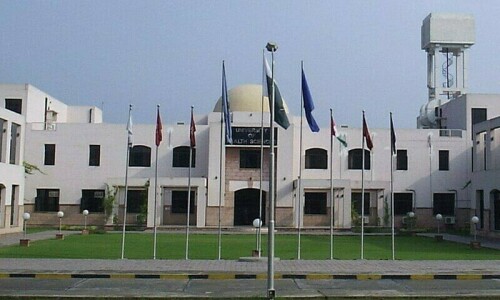LAHORE: ‘Aai Purayy Di Waa’ (The East Wind Comes), the fourth short stories collection of poet and fiction writer Nain Sukh whose real name is Khalid Mahmood, was launched at the Lahore Press Club on Sunday.
Besides short stories, Nain Sukh, who got his pen name from a painter of 18th century India, has got a novel and a collection of poems to his credit.
His poetry collection, Kikkar Day Angoor, was followed by short stories collections of, Theekrian, Uthal Pathal and Shaheed? However, Aai Puray Di Waa is a slightly different in terms of style of writing and subject.
“Nain Sukh’s last book, Shaheed?, was written with a lot of anger and angst,” said Professor Zubair Ahmad.
“But this current book seeps from a lot of love for his characters.”
He pointed out that in today’s context, what was happening in the country, the level of radicalism would never have stood a chance in front of any of the characters in his book.
The book revolves around a fictionalised account of six real characters from real life, including ID Shahbaz, a priest who translated into Punjabi the Christian (or the Book of Psalms as some scholars believe it to be).
“Today’s youth do not even know about these people and their achievements. Women don’t know, for example, about the struggle of Nasreen Anjum Bhatti. It is a sad situation,” Zubair lamented. It was a quality of Nain Sukh’s fiction that everything was real apart from the names, he added.
Dr Yaqoob Bangash termed the story of ID Shahbaz very important.
“It’s an exceptionally researched book which contextualises the man, ID Shahbaz, in the society he lived in rather than speaking about his works only. And it spells out what the society was going through, especially with so many conversions going on.”
Dr Bangash added that ID Shahbaz never changed his name or his identity after his conversion and that was important because it showed that the Punjabi Christian identity was developing, especially since most Christians in the north of united India were settled in Punjab and most missions came to this region.
“Yet his work had touched millions. His translated Punjabi hymns were sung all over the subcontinent and by people of other languages too.
“In today’s country and milieu, it is important to situate this person and through this particular story we learn also that Punjabi culture itself has the characteristic to assimilate into other cultures.”
The other characters in the book are Ubaidullah Sindhi, Dada Amir Haider, Agha Khan Sehotra, a Dalit leader of his time, Aliya Begum, a film, stage and TV actress, and Nasreen Anjum Bhatti, Punjabi feminist poet.
In an interview with Dawn, Nain Sukh said his stories always revolved around history, culture, and politics set in a dynamic social order.
“The common thread among these people (characters in the book) is that they were all liberals, all of them represented the masses who struggled for their causes,” he said.
“What is happening today would have appalled these people – all of them.”
Speaking about the Punjabi as a language, he said although there was an impression that Punjabi was a ‘dying language’ but it was not completely true. “There are many people who are trying their best to keep it alive. In India, the Gurmukhi script is being used while here we use the Urdu script for writing but writing is being done.”
Nain Sukh said there was more Punjabi poetry in the Pakistani side of Punjab while more prose on the Indian side.
Excerpts of all chapters were read out and discussions over them were held.
Speakers included Professor Azizuddin Ahmed, Abbas Siddiqui, Nadeem Muhammad, Iqbal Haider Butt, Hafiz Rashid Mehmood, Akram Warraich, Diep Saeeda, Naveed Alam while the session was conducted by Punjabi poet Afzal Sahir and Aamir Riaz.
Published in Dawn, November 27th, 2017












































Dear visitor, the comments section is undergoing an overhaul and will return soon.